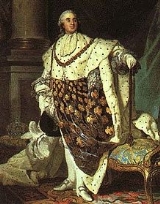
Louis XVI of France
Overview
Louis XVI was a Bourbon
monarch who ruled as King of France
and Navarre
until 1791, and then as King of the French from 1791 to 1792, before being executed
in 1793.
Succeeding his unpopular grandfather
, Louis XVI actively supported the Americans
, who were seeking their independence from Great Britain
, which was realized in the 1783 Treaty of Paris
. The example of the American Revolution
and the financial crisis which followed France's involvement in the war were two of the many contributing factors to the French Revolution
, which abolished the absolute monarchy in France
and proclaimed a constitutional monarchy in 1791.
While Louis XVI, as a constitutional king
, enjoyed broad popularity among the population, his indecisiveness and conservatism led some elements of the people of France to eventually view him as a symbol of the perceived tyranny of the Ancien Régime and his popularity deteriorated progressively.
House of Bourbon
The House of Bourbon is a European royal house, a branch of the Capetian dynasty . Bourbon kings first ruled Navarre and France in the 16th century. By the 18th century, members of the Bourbon dynasty also held thrones in Spain, Naples, Sicily, and Parma...
monarch who ruled as King of France
France
The French Republic , The French Republic , The French Republic , (commonly known as France , is a unitary semi-presidential republic in Western Europe with several overseas territories and islands located on other continents and in the Indian, Pacific, and Atlantic oceans. Metropolitan France...
and Navarre
Kingdom of Navarre
The Kingdom of Navarre , originally the Kingdom of Pamplona, was a European kingdom which occupied lands on either side of the Pyrenees alongside the Atlantic Ocean....
until 1791, and then as King of the French from 1791 to 1792, before being executed
Execution of Louis XVI
The execution of Louis XVI by means of the guillotine took place on 21 January 1793 at the Place de la Révolution in Paris. It was a major event of the French Revolution...
in 1793.
Succeeding his unpopular grandfather
Louis XV of France
Louis XV was a Bourbon monarch who ruled as King of France and of Navarre from 1 September 1715 until his death. He succeeded his great-grandfather at the age of five, his first cousin Philippe II, Duke of Orléans, served as Regent of the kingdom until Louis's majority in 1723...
, Louis XVI actively supported the Americans
France in the American Revolutionary War
France entered the American Revolutionary War in 1778, and assisted in the victory of the Americans seeking independence from Britain ....
, who were seeking their independence from Great Britain
American Revolutionary War
The American Revolutionary War , the American War of Independence, or simply the Revolutionary War, began as a war between the Kingdom of Great Britain and thirteen British colonies in North America, and ended in a global war between several European great powers.The war was the result of the...
, which was realized in the 1783 Treaty of Paris
Treaty of Paris (1783)
The Treaty of Paris, signed on September 3, 1783, ended the American Revolutionary War between Great Britain on the one hand and the United States of America and its allies on the other. The other combatant nations, France, Spain and the Dutch Republic had separate agreements; for details of...
. The example of the American Revolution
American Revolution
The American Revolution was the political upheaval during the last half of the 18th century in which thirteen colonies in North America joined together to break free from the British Empire, combining to become the United States of America...
and the financial crisis which followed France's involvement in the war were two of the many contributing factors to the French Revolution
French Revolution
The French Revolution , sometimes distinguished as the 'Great French Revolution' , was a period of radical social and political upheaval in France and Europe. The absolute monarchy that had ruled France for centuries collapsed in three years...
, which abolished the absolute monarchy in France
Absolute monarchy in France
France's political system of absolute monarchy was first initiated in the 16th century. After the period of the reformation monarchy which was mainly based on the political consensus between monarch, social classes and the submissive’s league, absolute monarchy slowly emerged in the 16th century...
and proclaimed a constitutional monarchy in 1791.
While Louis XVI, as a constitutional king
Constitutional monarchy
Constitutional monarchy is a form of government in which a monarch acts as head of state within the parameters of a constitution, whether it be a written, uncodified or blended constitution...
, enjoyed broad popularity among the population, his indecisiveness and conservatism led some elements of the people of France to eventually view him as a symbol of the perceived tyranny of the Ancien Régime and his popularity deteriorated progressively.
Unanswered Questions

